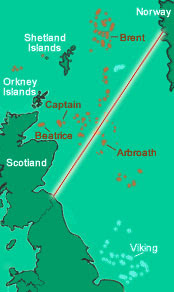Scotland documentary on N Sea oil - hilariously left-wing but still worth watching As mentioned previously, the Bloke has been working on another report for the TPA, this one on the Barnett Formula. Bottom line? In reality, the ScotNat oil story doesn't stack up. An independent Scotland would not be entitled to as much of the revenue as they claim, and the current high level of revenue is almost certainly unsustainable. On the other hand, if you're an English taxpayer, now might be a very good time to encourage your cousins North of the border to go for it. They can have their share of the oil, but we get to keep our own tax money. Labels: Scotland
SATURDAY, AUGUST 23, 2008
It's Scotland's Oil Jimmy
A key question is why English MPs have for so long tolerated a situation in which Scotland gets 20-25% more per capita funding for public services than their own constituents? That is a substantial differential and it has persisted at least since the mid-70s. You'd kinda think even today's pussycat lobby fodder English MPs might have done something about it by now.
The big picture answer is reckoned to be oil. It's said that the extra spending Scotland gets is roughly funded by Scotland's fair share of North Sea tax revenues (eg see here for a clear summary penned by BBC Evan Davis). English MPs are told to shut their gobs lest they provoke the Scots into UDI under their wily leader, the Thane of Salmond.
But how do the sums actually balance out?
According to the latest HM Treasury analysis, per capita spending on identifiable public services in Scotland was £1644 pa (22%) higher than in England (2007-08). Multiplied up by Scotland's 5.1m population, Scotland is getting c £8.5bn paadditional spending.
On the revenue side, HMT says North Sea revenue this year will be just under £10bn. So how much of that belongs to Scotland?
The ScotNats - who originally came up with the nifty slogan It's Scotland's Oilback in the early 70s - have always reckoned about 95% belongs to them. And it now turns out a top secret government report back in 1974 by economist Gavin McCrone (er... yes... a Scot), supported them.
But it's generally reckoned today's percentage is lower. A couple of years ago, m'learned friend The Devil produced this interesting map, showing how an entirely reasonable extrapolation of the land border would nix a large part of Scotland's claim:
Unfortunately, although that looks entirely reasonable when viewed from oil-poor Surrey, those pesky international lawyers have come up with their own rules. They're based on the median line of equidistance from national shorelines, and they swing the boundary a long way further South (on account of Scotland's grossly unfair sticky-out bit round Aberdeen):
That map is taken from the Scottish Governmnent's own analysis. Drawing on detailed work by Professor Alex Kemp and Linda Stephen from the University of Aberdeen, they reckon that Scotland's share over the last few years has been in the range 82-84% (click on table to enlarge):
Of course, if Scotland did declare UDI, the actual boundary would be "subject to negotiation" (as Kemp and Stephen acknowledge). But if we take their split as the current best guess, then this year an independent Scotland would get around £8-8.5bn of North Sea revenue. In other words, their "share " of the revenue would almost exactly balance the additional public spending they currently receive.
So that's cool then. All we English are doing is returning to the Scots the cash that rightfully belongs to them (after all, God gave them the oil, didn't he?).
Not so fast. Take a closer look at that table. Notice anything?
Yes, that's right. Until recently, North Sea revenues have been much lower. In fact, in the first three years (2002-03 to 2004-05) Scotland's share averaged only £4bn pa - only around half the extra spending they enjoy.
In reality it all comes down to the oil price. At today's extraordinary level, sure, an independent Scotland could continue with its current level of spending. But if prices slipped back closer to long-term averages (as they will - trust me), Scotland would soon need to call the IMF.
Just as a reminder, here's how the price of Brent crude has moved over the last 40 years, in both nominal and real terms (Source: OIL AND GAS. UK Oil & Gas Revenues: Implications for UK & Scottish Public Finances, CPPR 2008)
As we can see, today's price is way higher than the c $30 level suggested by history. Let's see how it looks after a good hard dose of recession.
PS That BBC Scotland doc is in seven sections on YouTube. It's called Truth, Lies, Oil and Scotland, which gives you a pretty good idea where it's coming from. As per, the BBC gives a free platform to Viscount Stansgate to explain yet again how, if only he'd been allowed to tell the IMF to bog off in 1976, he could have used the North Sea cash to create a socialist workers paradise. It goes on to explain how Thatcherism was Extremely Evil and how we'd otherwise be living in peace and harmony. But that aside, it's well worth viewing as a Look At Life on the N Sea.
Sunday, 24 August 2008
Posted by
Britannia Radio
at
08:47
![]()





















